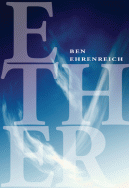 Ben Ehrenreich’s new novel, Ether (City Lights; 164 pages), follows an insomniac author living in a crumbling dystopia. He’s writing a novel about The Stranger, a man in a crusty white suit, an earthly manifestation of God. The premise of the novel-in-progress within Ether is that The Stranger has fallen to Earth and endeavors to return to heaven, intending to rectify some mistake for which his similarly fallen angels will not forgive him. Ehrenreich’s “broken hero” is consummately obstructed from his return by both misfortune and—here is the meat of it—kindnesses. By the end of the book, The Stranger has attempted murder several times, including upon the deaf mute who nurses him back to health.
Ben Ehrenreich’s new novel, Ether (City Lights; 164 pages), follows an insomniac author living in a crumbling dystopia. He’s writing a novel about The Stranger, a man in a crusty white suit, an earthly manifestation of God. The premise of the novel-in-progress within Ether is that The Stranger has fallen to Earth and endeavors to return to heaven, intending to rectify some mistake for which his similarly fallen angels will not forgive him. Ehrenreich’s “broken hero” is consummately obstructed from his return by both misfortune and—here is the meat of it—kindnesses. By the end of the book, The Stranger has attempted murder several times, including upon the deaf mute who nurses him back to health.
The curiously self-destructive behavior of God’s earthly manifestation is just one of Ether’s many surprising, if bleak, scenarios. The story bounds through doom-laden scenes, involving a whole cast of atypical, unpredictable people. A trio of skinheads does needlework while shaving each other’s heads, then brutalize The Stranger and rob him. A malicious grandson puts a beetle in his blind grandmother’s tea then pulls it out at the last minute, only to later on find the brutalized Stranger and gag him with a dead mouse. Though uncommon in their form, depictions of cruelty and inhumanity are abundant in Ether. This omnipresent gloom breaks occasionally, allowing a homeless child to pass the afternoon giggling on an abandoned trampoline, or a lonely teenager to fall in love. But Ehrenreich crushes these moments of cheer, as if determined to sink his characters in a hopeless mire.
On its surface, Ether might seem a bit of a self-indulgent diatribe, condemning creation as brutal and unjust. Digging a little deeper, Ehrenreich’s craft and intelligence become apparent. What first appears to be pessimistic fatalism is actually a series of parables about godhood, justice, love, war. Ether presents a world that may be darker than our own—depending on who you ask—but is brimming with the same mysteries. Ehrenreich is not indicting God or dismissing life as brutal and unjust, but rather desperately searching for meaning and beauty within brutality and injustice, concluding one component is inextricable from the other.
This Catch 22 is nowhere more evident and gut wrenching than the novel’s final moments, where the narrator finds himself just beyond a gate dividing thim from a happier, more cheerful version of his tale. As much as he fights with the gate to get through, he cannot; the latch is stuck. In his fine prose, Ehrenreich seems to be telling us he wishes he could give us a happier world to dwell in, but can’t.
